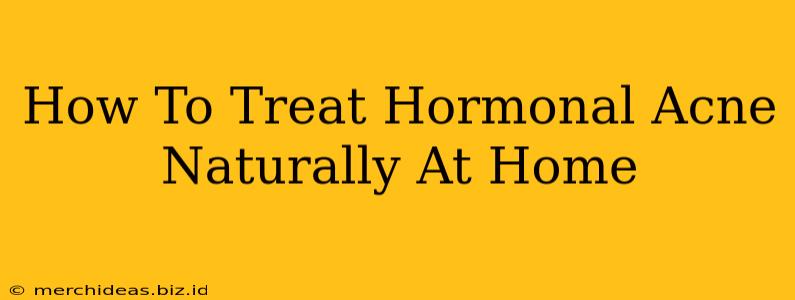Hormonal acne. Those pesky breakouts that seem to pop up right before your period, or during times of significant hormonal fluctuation. It's frustrating, unsightly, and can really impact your confidence. But before you reach for harsh chemicals and potentially damaging topical treatments, let's explore some natural, at-home methods to tackle this common skin concern.
Understanding Hormonal Acne
Before diving into treatment, it's crucial to understand what causes hormonal acne. It's primarily triggered by fluctuations in androgens, male hormones present in both men and women. These hormones stimulate sebaceous glands, leading to increased sebum production. Excess sebum clogs pores, creating the perfect environment for acne-causing bacteria to thrive. Stress, diet, and sleep patterns can also exacerbate the issue.
Key Factors Contributing to Hormonal Acne:
- Hormonal imbalances: Fluctuations in estrogen, progesterone, and testosterone are major culprits.
- Androgen levels: Elevated androgen levels stimulate sebum production.
- Genetics: A family history of acne increases your risk.
- Diet: High-glycemic foods and dairy can worsen acne.
- Stress: Stress hormones can trigger inflammation and exacerbate breakouts.
- Lack of sleep: Insufficient sleep disrupts hormone regulation.
Natural Ways to Treat Hormonal Acne at Home
Fortunately, several natural remedies can effectively manage and reduce hormonal acne. These methods focus on balancing hormones, reducing inflammation, and promoting clear skin.
1. Diet Adjustments: Fueling Your Skin From Within
What to eat:
- Fruits and vegetables: Rich in antioxidants that combat inflammation.
- Lean protein: Supports overall health and hormone balance.
- Whole grains: Provide sustained energy and fiber for gut health.
- Healthy fats: Essential for hormone production and cell function (e.g., avocados, nuts, seeds).
What to avoid:
- Processed foods: Often high in sugar and unhealthy fats.
- Dairy products: Some studies suggest a link between dairy and acne.
- High-glycemic foods: Can spike blood sugar and trigger inflammation.
2. Stress Management Techniques: Calm Your Mind, Clear Your Skin
Chronic stress significantly impacts hormone levels. Incorporating stress-reducing practices into your daily routine is vital:
- Yoga and meditation: Promote relaxation and reduce cortisol levels.
- Deep breathing exercises: Help calm the nervous system.
- Spending time in nature: A natural mood booster.
3. Topical Natural Remedies: Gentle Yet Effective
Several natural ingredients possess anti-inflammatory and antibacterial properties beneficial for acne:
- Tea tree oil: A potent natural antiseptic. Dilute it before applying to your skin.
- Aloe vera: Soothes inflammation and promotes healing.
- Green tea: Rich in antioxidants that combat inflammation and bacteria.
- Honey: Possesses antibacterial and anti-inflammatory properties.
4. Maintaining a Consistent Skincare Routine: Cleanse, Tone, Moisturize
A simple yet effective skincare routine is crucial:
- Gentle cleanser: Wash your face twice daily with a mild, non-comedogenic cleanser.
- Facial toner: Helps balance your skin's pH and remove excess oil.
- Moisturizer: Even oily skin needs hydration. Choose a non-comedogenic formula.
5. Prioritize Sleep: The Importance of Restful Nights
Aim for 7-8 hours of quality sleep each night. Adequate sleep is essential for hormone regulation and overall skin health.
When to See a Dermatologist
While these natural remedies can be effective for many, it's crucial to consult a dermatologist if your hormonal acne is severe, persistent, or accompanied by other symptoms. A dermatologist can provide a proper diagnosis and recommend appropriate treatment options, including prescription medications if necessary. They can also rule out other underlying skin conditions.
Disclaimer: This information is for educational purposes only and should not be considered medical advice. Always consult with a healthcare professional before starting any new treatment plan. Individual results may vary.
